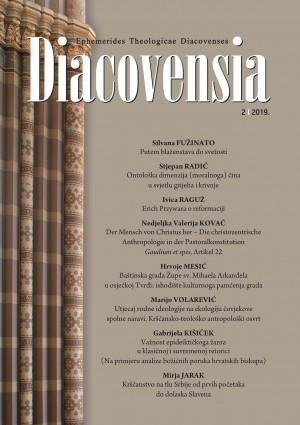Author(s): Stjepan Radić / Language(s): Croatian
Issue: 2/2019
Despite the widely held view that a metaphysical reflection on morality and fundamental principles does not help much, the goal of the article is to shed light on the source of moral discourse that necessarily begins with a metaphysical analysis of human acts. The method used by the author in the analysis of the act is analytical-ontological, and, moreover, it is shown to be the key one here. Thus, the first part of the analysis has provided great insights that undeniably reveal that human acts can be classified into two basic groups: the so-called transient (transitive) actions on the one side, and immanent (inner) on the other side. The fundamental characteristic of both types of actions, or acts, is change, whether it is singing, drawing, swimming (transient) or thinking, wanting, anger (immanent). The above examples show that one state of reality has moved or changed to another. The presented analysis served as the background for reflection on the concepts of sin and guilt, which through their complexity and quality necessarily fall into one of the presented types of action. Murder, theft, and adultery as transient, and hatred, greed, and lust as immanent transgressions, i.e. sins, also have as a consequence – as well as actions in general – a change, especially in the internal and then, consequently, also in the external area. The experience of sin is necessarily linked with the experience of guilt. The article, therefore, ends with a reflection on the phenomenology of guilt as an internal act. At the beginning it manifests itself as taking responsibility and, in the end, as repentance, which together with forgiveness, ultimately gives full meaning to guilt.
More...




